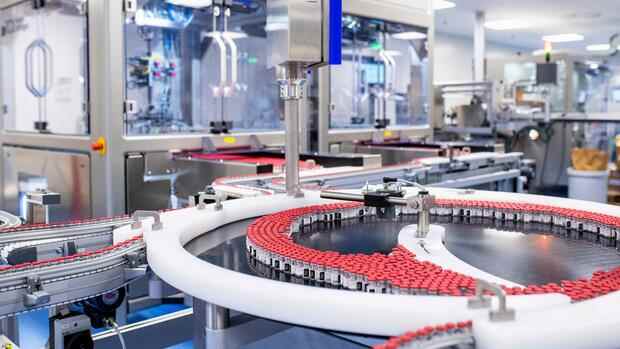Frankfurt The corona pandemic is causing enormous sales increases in the pharmaceutical industry: In 2021 and 2022, companies will generate sales of up to 200 billion dollars outside of normal business in connection with corona. In the past six months, the business with Covid vaccines and drugs has resulted in significant sales growth for a number of manufacturers, above all the US pharmaceutical giant Pfizer.
But the peak of the Covid boom has now clearly passed. In the next few quarters, revenues will fall again significantly. This is shown by an analysis of the half-year figures and the forecasts of leading companies in the field.
In the first half of the year, these companies had combined sales of around $68 billion from Covid vaccines and drugs. This corresponds to an increase of around 90 percent compared to the same period last year. The Covid business was once again the main growth driver for the industry and contributed more than two thirds to the increase in sales in the pharmaceutical sector.
Among the 20 pharmaceutical companies with the highest sales, including the two biotech climbers Biontech and Moderna, every second benefited from corona vaccines or drugs.
Top jobs of the day
Find the best jobs now and
be notified by email.
Industry leader Pfizer leads the field by a long way with almost $32 billion in Covid sales. The US group is currently benefiting from the Comirnaty vaccine developed together with Biontech and from its Covid drug Paxlovid, which has been ordered on a large scale by various governments – but has so far only been administered to a limited extent.
Pharmaceutical industry giants increase sales by 15 percent
Overall, the 20 largest drug manufacturers were able to increase their revenues by almost 15 percent to a total of 382 billion dollars in the first half of the year. Excluding the Covid business, that leaves about 4.5 percent growth in the established drug business on a dollar basis. Adjusted for currency effects, this should correspond to a real increase in sales of around seven percent.
In the Covid area, alongside Pfizer, the US competitor Merck & Co (with its antiviral agent Lagevrio) and the British pharmaceutical companies GSK and Astra-Zeneca (with their antibody drugs) recorded strong growth compared to the previous year. The vaccine manufacturer Moderna also grew by 72 percent in the half-year and was thus well above average, while Biontech was only able to increase by 17 percent compared to the already high revenues in the first half of 2021.
>>Read also: The Omicron vaccine is scheduled to come in October – and bring about a turnaround in sales for Biontech
For almost all players, however, the following applies: In the second half of the year, sales and growth rates will be significantly lower. All in all, the companies’ forecasts so far point to an increase in full-year Covid revenues of 14 to 16 percent to around $110 billion, compared to around $96 billion in the previous year. From this, in turn, it can be deduced that the Covid business in the second half of the year should be around 40 percent lower than in the first half of the year and a third lower than in the previous year.
This is primarily due to the fact that vaccine orders worth billions have now mostly been delivered, while there is relatively little demand for vaccines from end users worldwide and governments are hardly signing new contracts.
Novavax and Valneva: No orders for vaccines
The situation is particularly difficult for those lagging behind in vaccine development. The American biotech company Novavax, whose protein-based Covid vaccine has now been approved in both the EU and the USA, even had to halve its sales forecast for 2022 last week. to 2 to 2.3 billion dollars. The reason given by company boss Stanley Erck was that expected orders from the US government and the Gavi vaccine alliance did not materialize.
Meanwhile, the EU recently renegotiated a supply deal with France’s Valneva, reducing supplies to a modest 1.25 million cans. Originally, 60 million doses of Valneva’s inactivated vaccine were intended to be purchased.
EU states have drastically reduced their orders for Valneva’s dead vaccine.
(Photo: AP)
For Pfizer, the current guidance for 2022 shows that vaccine sales will still be around $10 billion in the second half of the year, compared to more than $20 billion in the first half. Only at Moderna should the proceeds remain almost constant at around ten billion dollars in the second half of the year.
As far as Covid drugs are concerned, demand has apparently peaked. Only the Pfizer drug Paxlovid is likely to increase sales in the second half of the year due to existing supply contracts.
>>Read also: Get out of the fringe business: The new billion dollar recipe from the pharmaceutical giants
For all other manufacturers, they are expected to be significantly lower than in the first half of the year. Merck & Co, for example, calculates sales of up to 5.5 billion dollars for the whole year for Lagevrio, after 4.4 billion in the first half of the year.
The trend among suppliers of antibody preparations against Covid is similar. GSK CFO Iain Mackay pointed out in the most recent quarterly call that the lion’s share of the expected Covid sales were made in the first half of the year. “Based on the contracts with governments, we assume that sales will be significantly lower in the second half of the year,” said Mackay.
More: Pfizer on a shopping spree: This is how the pharmaceutical giant wants to grow with the corona billions.
